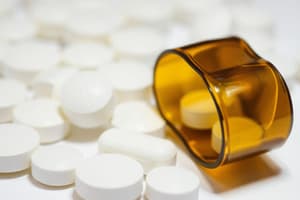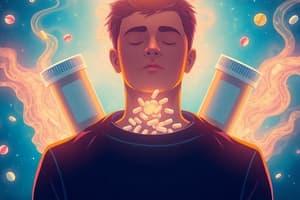Podcast
Questions and Answers
Which of the following medications belongs to the category of atypical antipsychotics?
Which of the following medications belongs to the category of atypical antipsychotics?
- Fluphenazine
- Thiothixene
- Olanzapine (correct)
- Haloperidol
What is the primary route of administration for the selective serotonin reuptake inhibitors (SSRIs) listed?
What is the primary route of administration for the selective serotonin reuptake inhibitors (SSRIs) listed?
- Injection
- Transdermal
- Oral (correct)
- Intranasal
Which medication is classified as a norepinephrine dopamine reuptake inhibitor (NDRI)?
Which medication is classified as a norepinephrine dopamine reuptake inhibitor (NDRI)?
- Bupropion (correct)
- Citalopram
- Duloxetine
- Sertraline
Which of the following medications is a tricyclic antidepressant (TCA)?
Which of the following medications is a tricyclic antidepressant (TCA)?
What type of medication is Buspirone?
What type of medication is Buspirone?
Which mood stabilizer is also known as Lithobid?
Which mood stabilizer is also known as Lithobid?
Which of the following medications is indicated for use as an antidepressant?
Which of the following medications is indicated for use as an antidepressant?
Which medication is known as an atypical antipsychotic and is primarily used to treat schizophrenia?
Which medication is known as an atypical antipsychotic and is primarily used to treat schizophrenia?
What is the primary therapeutic effect of benzodiazepines?
What is the primary therapeutic effect of benzodiazepines?
Which class of medications includes Lurasidone?
Which class of medications includes Lurasidone?
Which medication is considered a serotonin and norepinephrine reuptake inhibitor (SNRI)?
Which medication is considered a serotonin and norepinephrine reuptake inhibitor (SNRI)?
What is the main function of mood stabilizers such as Lithium carbonate?
What is the main function of mood stabilizers such as Lithium carbonate?
Which of the following medications is associated with the treatment of anxiety?
Which of the following medications is associated with the treatment of anxiety?
What is the route of administration for Fluoxetine?
What is the route of administration for Fluoxetine?
Which medication is primarily classified as a tricyclic antidepressant?
Which medication is primarily classified as a tricyclic antidepressant?
Which medication would be categorized as a non-benzodiazepine anxiolytic?
Which medication would be categorized as a non-benzodiazepine anxiolytic?
What is the role of antidepressants such as Trazodone?
What is the role of antidepressants such as Trazodone?
Which medication is known to affect norepinephrine and serotonin levels?
Which medication is known to affect norepinephrine and serotonin levels?
Study Notes
Typical Antipsychotics
- Chlorpromazine (Thorazine), Fluphenazine, Haloperidol, Trifluoperazine, Thioridazine, Perphenazine, Thiothixene, and Pimozide
- These medications are grouped under a category called typical antipsychotics
Atypical Antipsychotics
- Aripiprazole, Clozapine, Ziprasidone, Asenapine, Brexpiprazole, Risperidone, Lurasidone, Olanzapine, Quetiapine, Paliperidone, and Lumazaperone
- These medications are grouped under a category called atypical antipsychotics
Norepinephrine Dopamine Reuptake Inhibitors (NDRIs)
- Bupropion is the only NDRI listed
Selective Serotonin Reuptake Inhibitors (SSRIs)
- Fluoxetine, Citalopram, Sertraline, Paroxetine, Fluvoxamine, and Escitalopram
- All are administered orally
Serotonin and Norepinephrine Reuptake Inhibitors (SNRIs)
- Venlafaxine and Duloxetine
Tricyclic Antidepressants (TCAs)
- Amitriptyline, Imipramine, Nortriptyline, Doxepin, Mirtazapine, and Amoxetine
- These medications are grouped under a category called tricyclic antidepressants
Antidepressants
- Trazodone (Desyrel)
Benzodiazepines
- Chlordiazepoxide (Librium), Diazepam, Alprazolam, Clonazepam, and Lorazepam
Nonbenzodiazepines
- Buspirone
Mood Stabilizers
- Lithium carbonate (Lithane, Lithobid), Valproic acid, Carbamazepine, and Lamotrigine
- These medications are used to treat mood disorders
- They help stabilize moods
Other Medications
- Phenelzine sulfate, Isocarboxazid, Selegiline (Transdermal), Tranylcypromine, Zolpidem, and Ramelteon
- These medications are commonly used for mental health conditions
- Some medications are administered via routes including oral, injection, or transdermal.
Antipsychotics
- Typical Antipsychotics are older medications with a higher likelihood of causing extrapyramidal symptoms (EPS) like muscle stiffness, tremors, and akinesia.
- Examples: Chlorpromazine (Thorazine), Fluphenazine, Haloperidol, Trifluoperazine, Thioridazine, Perphenazine, Thiothixene, Pimozide
- Atypical Antipsychotics are newer medications with a lower risk of EPS, but they can cause metabolic side effects like weight gain, diabetes, and hyperlipidemia.
- Examples: Aripiprazole, Clozapine, Ziprasidone, Asenapine, Brexpiprazole, Risperidone, Lurasidone, Olanzapine, Quetiapine, Paliperidone, Lumazaperone
Antidepressants
- Norepinephrine Dopamine Reuptake Inhibitors (NDRIs) are used to treat depression, smoking cessation, and ADHD.
- Example: Bupropion
- Selective Serotonin Reuptake Inhibitors (SSRIs) block the reuptake of serotonin in the brain, leading to an increase in serotonin levels and improved mood.
- Examples: Fluoxetine, Citalopram, Sertraline, Paroxetine, Fluvoxamine, Escitalopram
- Serotonin and Norepinephrine Reuptake Inhibitors (SNRIs) block the reuptake of both serotonin and norepinephrine, leading to a synergistic effect on mood and energy.
- Examples: Venlafaxine, Duloxetine
- Tricyclic Antidepressants (TCAs) block the reuptake of serotonin and norepinephrine, but they can cause several side effects, including drowsiness, dry mouth, constipation, and blurred vision.
- Examples: Amitriptyline, Imipramine, Nortriptyline, Doxepin, Mirtazapine, Amoxetine
- Other Antidepressants:
- Trazodone (Desyrel) is a unique antidepressant that can be used for insomnia and anxiety.
Anxiolytics
- Benzodiazepines are a class of medications used to treat anxiety, seizures, and insomnia. They work by enhancing the effects of GABA, a neurotransmitter that inhibits nerve activity.
- Examples: Chlordiazepoxide (Librium), Diazepam, Alprazolam, Clonazepam, Lorazepam
- Nonbenzodiazepines
- Buspirone is a non-benzodiazepine anxiolytic, used to treat anxiety without causing sedation.
Mood Stabilizers
- Mood Stabilizers are used to treat bipolar disorder to prevent mood swings from mania to depression.
- Examples: Lithium carbonate (Lithane, Lithobid), Valproic acid, Carbamazepine, Lamotrigine
Other Medications
- Monoamine Oxidase Inhibitors (MAOIs) are older antidepressants with a higher risk of side effects, but they can be effective for treating atypical depression.
- Examples: Phenelzine sulfate, Isocarboxazid, Selegiline (Transdermal), Tranylcypromine
- Hypnotics are medications used to treat insomnia.
- Zolpidem and Ramelteon are examples of hypnotics.
Studying That Suits You
Use AI to generate personalized quizzes and flashcards to suit your learning preferences.
Related Documents
Description
This quiz covers different classes of psychotropic medications, including typical and atypical antipsychotics, norepinephrine dopamine reuptake inhibitors (NDRIs), selective serotonin reuptake inhibitors (SSRIs), serotonin and norepinephrine reuptake inhibitors (SNRIs), and tricyclic antidepressants (TCAs). Test your knowledge on these essential psychiatric drugs and their classifications.




